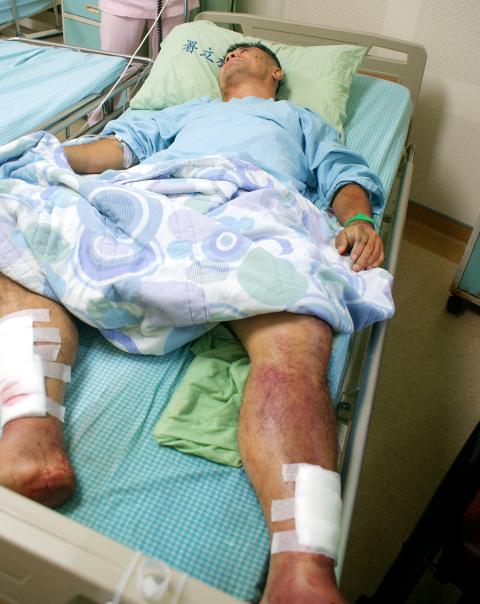A reporter was beaten by masked men early on Wednesday morning in an incident he claimed could be related to the legislative election on Saturday.
Greater -Kaohsiung-based reporter Chiang Wen-hsin (江文兟), 56, who works for the -Chinese--language Taiwan Times, was beaten by four men wielding baseball bats who pushed their way into his residence when he returned home early on Wednesday morning.
As a result of the attack, both Chiang’s legs were broken and he suffered multiple broken ribs and fingers.

Photo: Taipei Times
Although his injuries were not life-threatening, the damage to his hands means that Chiang will be unable to write any news articles until her recovers.
“I do not have disputes with anybody,” Chiang said.
He later added that the legislative elections in Greater Kao-hsiung had at times been quite tense.
At one point he received a call from a supporter of a certain political faction accusing him of writing articles that were biased.
According to the police, Chiang returned to his home in Ciweishan (旗尾山) after meeting with friends at a McDonalds in Greater Kaohsiung’s Cishan District (旗山) and was attacked outside his residence.
The attack lasted for about 10 minutes and he was only able to shout for help after regaining consciousness, Chiang said.
The police’s New Year Security Taskforce, an annual group formed during the Lunar New Year period to patrol local areas and step up security, stated work on Tuesday.
Police stopping motorists on Ciwei Bridge and conducting sobriety tests said that a white car refused to stop, but managed to escape, after being chased by police. The police have listed the passengers of the vehicle as prime suspects in the beating.
A special team has been established to investigate the case.
The police declined to comment on whether the attack on Chiang was motivated by an election--related dispute or something else, saying only that the investigation was ongoing.
In response, the Taiwan Times issued a statement saying that it strongly condemned violence and expected the police to arrest the perpetrators as soon as possible.
Translated by Jake Chung, Staff Writer

The Central Weather Administration (CWA) yesterday said it expected to issue a sea warning for Typhoon Fung-Wong tomorrow, which it said would possibly make landfall near central Taiwan. As of 2am yesterday, Fung-Wong was about 1,760km southeast of Oluanpi (鵝鑾鼻), Taiwan’s southernmost point, moving west-northwest at 26kph. It is forecast to reach Luzon in the northern Philippines by tomorrow, the CWA said. After entering the South China Sea, Typhoon Fung-Wong is likely to turn northward toward Taiwan, CWA forecaster Chang Chun-yao (張峻堯) said, adding that it would likely make landfall near central Taiwan. The CWA expects to issue a land

Taiwan’s exports soared to an all-time high of US$61.8 billion last month, surging 49.7 percent from a year earlier, as the global frenzy for artificial intelligence (AI) applications and new consumer electronics powered shipments of high-tech goods, the Ministry of Finance said yesterday. It was the first time exports had exceeded the US$60 billion mark, fueled by the global boom in AI development that has significantly boosted Taiwanese companies across the international supply chain, Department of Statistics Director-General Beatrice Tsai (蔡美娜) told a media briefing. “There is a consensus among major AI players that the upcycle is still in its early stage,”

The Central Weather Administration (CWA) yesterday said it is expected to issue a sea warning for Typhoon Fung-wong this afternoon and a land warning tomorrow. As of 1pm, the storm was about 1,070km southeast of Oluanpi (鵝鑾鼻), Taiwan’s southernmost point, and was moving west-northwest at 28 to 32kph, according to CWA data. The storm had a radius of 250km, with maximum sustained winds of 173kph and gusts reaching 209kph, the CWA added. The storm is forecast to pass near Luzon in the Philippines before entering the South China Sea and potentially turning northward toward Taiwan, the CWA said. CWA forecaster Chang Chun-yao (張峻堯) said

‘SECRETS’: While saying China would not attack during his presidency, Donald Trump declined to say how Washington would respond if Beijing were to take military action US President Donald Trump said that China would not take military action against Taiwan while he is president, as the Chinese leaders “know the consequences.” Trump made the statement during an interview on CBS’ 60 Minutes program that aired on Sunday, a few days after his meeting with Chinese President Xi Jinping (習近平) in South Korea. “He [Xi] has openly said, and his people have openly said at meetings, ‘we would never do anything while President Trump is president,’ because they know the consequences,” Trump said in the interview. However, he repeatedly declined to say exactly how Washington would respond in